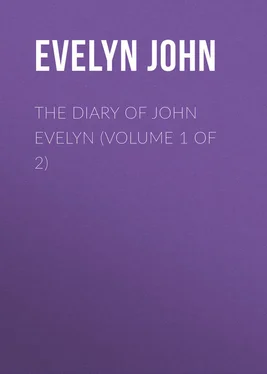John Evelyn - The Diary of John Evelyn (Volume 1 of 2)
Здесь есть возможность читать онлайн «John Evelyn - The Diary of John Evelyn (Volume 1 of 2)» — ознакомительный отрывок электронной книги совершенно бесплатно, а после прочтения отрывка купить полную версию. В некоторых случаях можно слушать аудио, скачать через торрент в формате fb2 и присутствует краткое содержание. Жанр: История, foreign_antique, foreign_prose, на английском языке. Описание произведения, (предисловие) а так же отзывы посетителей доступны на портале библиотеки ЛибКат.
- Название:The Diary of John Evelyn (Volume 1 of 2)
- Автор:
- Жанр:
- Год:неизвестен
- ISBN:нет данных
- Рейтинг книги:3 / 5. Голосов: 1
-
Избранное:Добавить в избранное
- Отзывы:
-
Ваша оценка:
- 60
- 1
- 2
- 3
- 4
- 5
The Diary of John Evelyn (Volume 1 of 2): краткое содержание, описание и аннотация
Предлагаем к чтению аннотацию, описание, краткое содержание или предисловие (зависит от того, что написал сам автор книги «The Diary of John Evelyn (Volume 1 of 2)»). Если вы не нашли необходимую информацию о книге — напишите в комментариях, мы постараемся отыскать её.
The Diary of John Evelyn (Volume 1 of 2) — читать онлайн ознакомительный отрывок
Ниже представлен текст книги, разбитый по страницам. Система сохранения места последней прочитанной страницы, позволяет с удобством читать онлайн бесплатно книгу «The Diary of John Evelyn (Volume 1 of 2)», без необходимости каждый раз заново искать на чём Вы остановились. Поставьте закладку, и сможете в любой момент перейти на страницу, на которой закончили чтение.
Интервал:
Закладка:
October, 1699, his elder brother, George Evelyn, dying without male issue, aged eighty-three, he succeeded to the paternal estate; and in May following, he quitted Sayes Court and went to Wotton, where he passed the remainder of his life, with the exception of occasional visits to London, where he retained a house. In the great storm of 1703, he mentions in his last edition of the "Sylva," above one thousand trees were blown down in sight of his residence.
He died at his house in London, 27th February, 1705-6, in the eighty-sixth year of his age, and was buried at Wotton. His lady survived him nearly three years, dying 9th February, 1708-9, in her seventy-fourth year, and was buried near him at Wotton.
Of Evelyn's children, a son, who died at the age of five, and a daughter, who died at the age of nineteen, were almost prodigies. The particulars of their extraordinary endowments, and the profound manner in which he was affected at their deaths, may be seen in these volumes.
One daughter was well and happily settled; another less so; but she did not survive her marriage more than a few months. The only son who lived to the age of manhood, inherited his father's love of learning, and distinguished himself by several publications.
Mr. Evelyn's employment as a Commissioner for the care of the Sick and Wounded was very laborious; and, from the nature of it, must have been extremely unpleasant. Almost the whole labor was in his department, which included all the ports between the river Thames and Portsmouth; and he had to travel in all seasons and weathers, by land and by water, in the execution of his office, to which he gave the strictest attention. It was rendered still more disagreeable by the great difficulty which he found in procuring money for support of the prisoners. In the library at Wotton, are copies of numerous letters to the Lord Treasurer and Officers of State, representing, in the strongest terms, the great distress of the poor men, and of those who had furnished lodging and necessaries for them. At one time, there were such arrears of payment to the victuallers, that, on landing additional sick and wounded, they lay some time in the streets, the publicans refusing to receive them, and shutting up their houses. After all this trouble and fatigue, he found as great difficulty in getting his accounts settled. 2 2 2d October, 1665, he writes to the Lord Chancellor, Lord Arlington, Sir William Coventry, and Sir Philip Warwick, complaining of want of money for the prisoners: praying that while he and his brother Commissioners adventure their persons and all that is dear to them, in this uncomfortable service, they may not be exposed to ruin, and to a necessity of abandoning their care; and adding that they have lost their officers and servants by the pestilence, and are hourly environed with the saddest objects of perishing people. "I have," says he, "fifteen places full of sick men, where they put me to unspeakable trouble; the magistrates and justices, who should further us in our exigencies, hindering the people from giving us quarters, jealous of the contagion, and causing them to shut the doors at our approach."
In January, 1665-6, he formed a plan for an Infirmary at Chatham, which he sent to Mr. Pepys, to be laid before the Admiralty, with his reasons for recommending it; but it does not appear that it was carried into execution.
His employments, in connection with the repair of St. Paul's (which, however, occupied him but a brief time), as in the Commission of Trade and Plantations, and in the building of Greenwich Hospital, were much better adapted to his inclinations and pursuits.
As a Commissioner of the Privy Seal in the reign of King James II., he had a difficult task to perform. He was most steadily attached to the Church of England, and the King required the Seal to be affixed to many things incompatible with the welfare of that Church. This, on some occasions, he refused to do, particularly to a license to Dr. Obadiah Walker to print Popish books; 3 3 Dr. Walker had been a member of the Church of England, but had renounced it, and turned Papist.
and on other occasions he absented himself, leaving it to his brother Commissioners to act as they thought fit. Such, however, was the King's estimation of him, that no displeasure was evinced on this account.
Of Evelyn's attempt to bring Colonel Morley (Cromwell's Lieutenant of the Tower, immediately preceding the Restoration) over to the King's interest, an imperfect account is given in the "Biographia." The fact is, that there was great friendship between these gentlemen, and Evelyn did endeavor to engage the Colonel in the King's interest. He saw him several times, and put his life into his hands by writing to him on 12th January, 1659-60; he did not succeed, and Colonel Morley was too much his friend to betray him; but so far from the Colonel having settled matters privately with Sir Anthony Ashley Cooper, or General Monk, as there described, he was obliged, when the Restoration took place, actually to apply to Evelyn to procure his pardon; who obtained it accordingly, though, as he states, the Colonel was obliged to pay a large sum of money for it. This could not have happened, if there had been any previous negotiation with General Monk.
Dr. Campbell took some pains to vindicate Mr. Evelyn's book, entitled, "Navigation and Commerce, their Origin and Progress," from the charge of being an imperfect work, unequal to the expectation excited by the title. But the Doctor, who had not the information which this Journal so amply affords on this subject, was not aware that what was so printed was nothing more than an Introduction to the History of the Dutch War; a work undertaken by Evelyn at the express command of King Charles II., and the materials for which were furnished by the Officers of State. The completion of this work, after considerable progress had been made in it, was put a stop to by the King himself, for what reason does not appear; but perhaps it was found that Evelyn was inclined to tell too much of the truth concerning a transaction, which it will be seen by his Journal that he utterly reprobated. His copy of the History, as far as he had proceeded, he put into the hands of his friend, Mr. Pepys, of the Admiralty, who did not return it; but the books and manuscripts belonging to Mr. Pepys passed into the possession of Magdalen College, Cambridge.
From the numerous authors who have spoken in high terms of Mr. Evelyn, we will select the two following notices of him.
In the "Biographia Britannica" Dr. Campbell says, "It is certain that very few authors who have written in our language deserve the character of able and agreeable writers so well as Mr. Evelyn, who, though he was acquainted with most sciences, and wrote upon many different subjects, yet was very far, indeed the farthest of most men of his time, from being a superficial writer. He had genius, he had taste, he had learning; and he knew how to give all these a proper place in his works, so as never to pass for a pedant, even with such as were least in love with literature, and to be justly esteemed a polite author by those who knew it best."
Horace Walpole (afterward Earl of Orford), in his Catalogue of Engravers, gives us the following admirably drawn character: "If Mr. Evelyn had not been an artist himself, as I think I can prove he was, I should yet have found it difficult to deny myself the pleasure of allotting him a place among the arts he loved, promoted, patronized; and it would be but justice to inscribe his name with due panegyric in these records, as I have once or twice taken the liberty to criticise him. But they are trifling blemishes compared with his amiable virtues and beneficence; and it may be remarked that the worst I have said of him is, that he knew more than he always communicated. It is no unwelcome satire to say, that a man's intelligence and philosophy is inexhaustible. I mean not to write his biography, but I must observe, that his life, which was extended to eighty-six years, was a course of inquiry, study, curiosity, instruction, and benevolence. The works of the Creator, and the minute labors of the creature, were all objects of his pursuit. He unfolded the perfection of the one, and assisted the imperfection of the other. He adored from examination; was a courtier that flattered only by informing his Prince, and by pointing out what was worthy of him to countenance; and really was the neighbor of the Gospel, for there was no man that might not have been the better for him. Whoever peruses a list of his works will subscribe to my assertion. He was one of the first promoters of the Royal Society; a patron of the ingenious and the indigent; and peculiarly serviceable to the lettered world; for, besides his writings and discoveries, he obtained the Arundelian Marbles for the University of Oxford, and the Arundelian Library for the Royal Society. Nor is it the least part of his praise, that he who proposed to Mr. Boyle the erection of a Philosophical College for retired and speculative persons, had the honesty to write in defense of active life against Sir George Mackenzie's 'Essay on Solitude.' He knew that retirement, in his own hands, was industry and benefit to mankind; but in those of others, laziness and inutility."
Читать дальшеИнтервал:
Закладка:
Похожие книги на «The Diary of John Evelyn (Volume 1 of 2)»
Представляем Вашему вниманию похожие книги на «The Diary of John Evelyn (Volume 1 of 2)» списком для выбора. Мы отобрали схожую по названию и смыслу литературу в надежде предоставить читателям больше вариантов отыскать новые, интересные, ещё непрочитанные произведения.
Обсуждение, отзывы о книге «The Diary of John Evelyn (Volume 1 of 2)» и просто собственные мнения читателей. Оставьте ваши комментарии, напишите, что Вы думаете о произведении, его смысле или главных героях. Укажите что конкретно понравилось, а что нет, и почему Вы так считаете.












